What Is a Ghost? A Tragedy Condemned to Repeat Itself Time and Again?
[With Guillermo del Toro'south new picture show Crimson Elevation opening adjacent Fri, I decided to take a look back at the director'south filmography.]
"What is a ghost? A tragedy condemned to repeat itself time and over again? An instant of hurting, perhaps. Something expressionless which still seems to be alive. An emotion suspended in time. Like a blurred photograph. Like an insect trapped in amber." – Dr. Casares, The Devil's Backbone
Despite the wreckage of Mimic , Guillermo del Toro was all the same being offered Hollywood films. Specifically, New Line Cinema wanted him for Bract Two . However, he stressed that if they really wanted him, they would expect for him to make The Devil's Courage, a moving picture where all of del Toro's talent comes together to tell a story of love and tragedy that'southward perfectly mixed together.
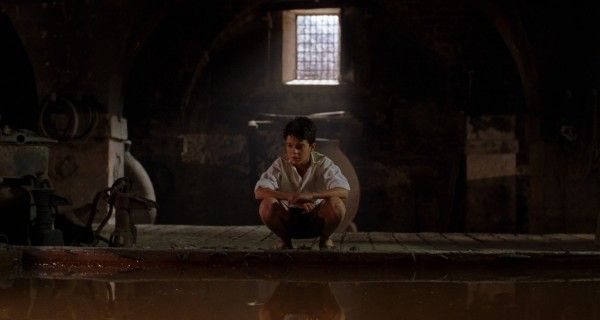
The Devil's Backbone is a beautifully told ghost story where the real ghost isn't Santi (Junio Valverde) the dead boy wandering the grounds of an orphanage during the Castilian Civil War. Everyone is in his or her ain personal purgatory likewise equally the purgatory of war just beyond the horizon. The unexploded bomb in the eye of the orphanage courtyard is a abiding reminder that they're all on borrowed time, and death surrounds them. It'south a story about cleaved people trapped by their circumstances, and the sadness and loss that pervade their situations. And nevertheless information technology never feels overbearing because del Toro cleverly colored it with a supernatural flourish and put charming child actors at the forefront.
It'south a "ghost story", only del Toro knew not to lean as well heavily on the particulars of the supernatural, and instead focused on the man element. We follow Carlos (Fernando Tielve), an orphan who doesn't fifty-fifty know how much of an orphan he truly is (he thinks his father, who fought for the Leftists, is still alive). Abandoned past his tutor at the orphanage, it's not long before Carlos starts seeing the ghost, who the others call "the i who sighs", and if del Toro had kept a fixed position on his young protagonist, The Devil'southward Courage would accept been perfectly serviceable ghost story. It would be a gorgeous motion-picture show, simply it would lack the depth and dash of expanding the story to the developed characters.
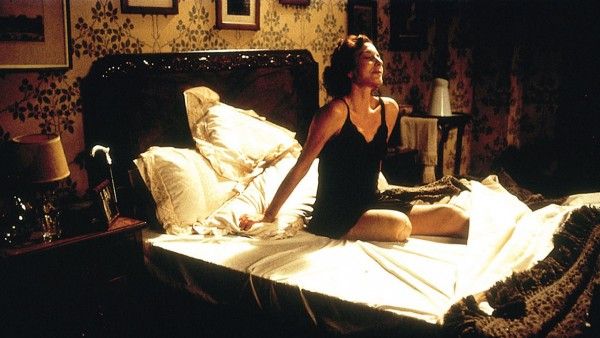
Where the story gets its richness is in showing how the adults—the ones who are supposed to have the maturity to have care of the immature boys—are as deeply screwed up as their wards. Devil's Backbone has a plot, just it'southward non really a plot-driven picture across the mystery of who killed Santi and why. Far more energy is put into the complicated web of relationships betwixt Dr. Casares (Federico Luppi), the headmistress Carmen (Marisa Paredes), and the flagman Jacinto (Eduardo Noriega).
These three characters could each fit Casares' musing almost what it means to be a "ghost". They're all stuck in their old relationships, nursing former wounds. Carmen is bitter that she now bears the responsibility of carrying on the cause even though her husband, who was the true "revolutionary", is dead. Jacinto is the "lamentable lilliputian prince" who believes he's entitled to a kingdom. And Casares pines for Carmen, but she will never love him dorsum. It all comes right up to the line of beingness a soap opera, but because del Toro is and so earnest and never plays it for melodrama, the aching honesty works.
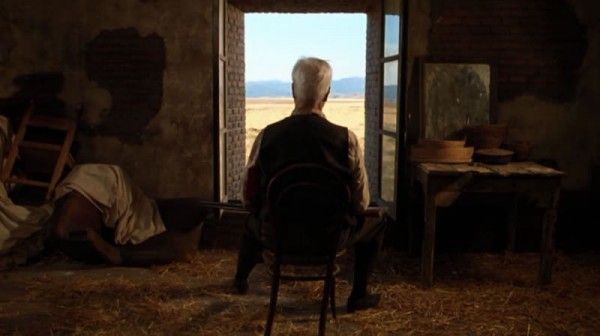
The Devil'due south Courage counts amid del Toro'southward best because while his love of monsters may serve as a hook, it'south his earnestness and adoration for characters that take made for his best movies. That earnestness sells the moment where Casares recites a love poem to Carmen, the love of his life, while she dies. It'south a moment that could have come beyond as incredibly cheesy if del Toro didn't take total conviction in the storytelling. Accept away the manager'south earnestness, and you only have a very enthusiastic designer.
While The Devil's Courage may non be as ornate as the director's later pictures, the framing and design are but as impeccable equally whatsoever of his studio films. There may just be i supernatural element—the ghost—but del Toro puts equally much energy into the design as annihilation else he does. Depicting Santi'south caput wound as constantly bleeding upwards every bit if he'due south underwater stresses the "trapped in bister" clarification from the opening narration. It's horrific, simply it's also thematically relevant, which is one of the many reasons Devil'south Backbone transcends del Toro's previous films.
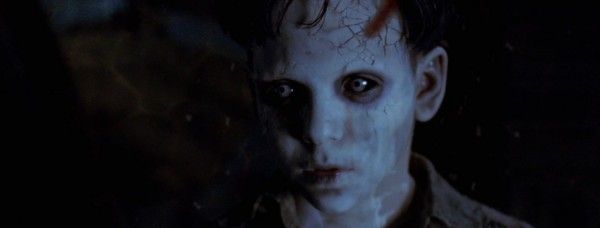
I don't want to say that Cronos or Mimic are dishonest movies, but they're compromised. Cronos is injure by the director's lack of experience, and interfering producers undermined Mimic. They're movies that didn't fully realize the managing director's vision, and Devil's Backbone feels like the kickoff time we truly go that from del Toro. While he'south typically associated with fanciful monsters, it'due south actually more well-nigh wearing his bleeding heart on his sleeve.
While information technology can be argued that Pan's Labyrinth is the managing director's virtually "complete" film since information technology indulges the fantastical side that Devil's Backbone largely leaves behind, I see them more equally companion films rather than separate pieces in his evolution. The Devil's Courage only keeps its supernatural element tied into a thematic level. Casares' opening narration tells us that we're watching an all-likewise-human ghost story, and then we don't need literal monsters. The figurative ones nosotros face daily are powerful enough.
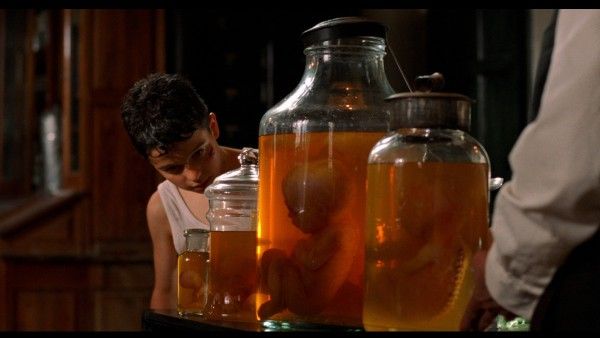
Through The Devil's Backbone, nosotros run across the crippling emotions of jealousy and fright spread throughout the orphanage, and information technology's articulate that while the ghost may exist physically scary, he's never as fearsome as Jacinto, a man who believes he's entitled to riches and is willing to practise anything to become them. Jacinto comes right up to the line of a moustache-twirling villain, just del Toro goes out of his way to brand sure that at that place's some ounce of relatable humanity in the character considering it'due south this failed humanity that interests del Toro.
Even though there's a fleeting moment of "justice" by having the kids kill Jacinto, the movie ends on a melancholy note, and that melancholy is where del Toro ultimately lives even though he can't resist his odd, deeply twisted touches (notably that the "limbo juice" holding preserved fetuses is existence sold to the townspeople for erectile dysfunction). Both Pan's Labyrinth and Devil's Backbone have immature protagonists, merely Devil'south Courage, far more than the fairy tale trappings of Pan's Labyrinth, has a sorrowful view of human being history and humanity as opposed to individuals. We're all "insects trapped in amber" and while the surviving orphans begin with a walk to places unknown, they'll likely get in to the same kind of suffering—the aforementioned jealousies, regrets, and fears—we all do. The Devil's Backbone places all of united states in a living purgatory with only brief flickers of grace.
Following this massive bound frontwards non only as storyteller only also as a filmmaker (The Devil'due south Backbone is a technically stunning film), del Toro stayed true to his word and would at present move to lighter territory with the Daywalker.
Tomorrow: Blade Ii
Other Entries:
- Cronos
- Mimic: The Manager's Cut
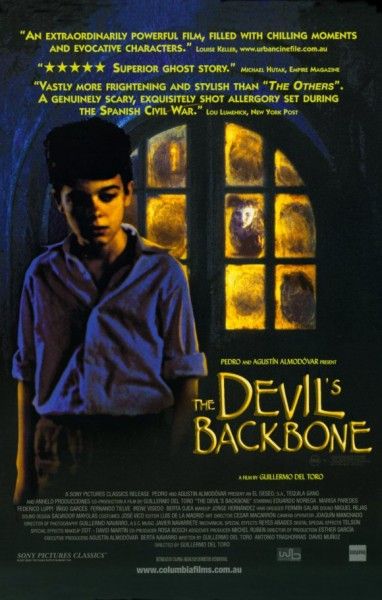
Nearly The Author
Source: https://collider.com/devils-backbone-guillermo-del-toro-movies-review/

0 Response to "What Is a Ghost? A Tragedy Condemned to Repeat Itself Time and Again?"
ارسال یک نظر